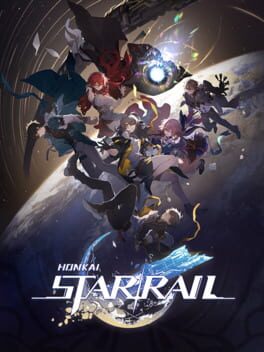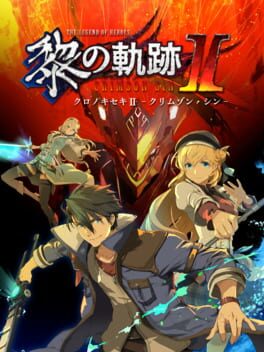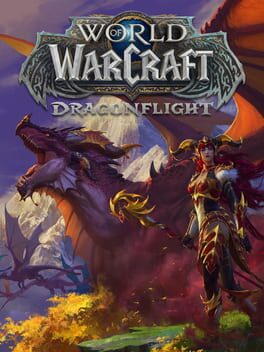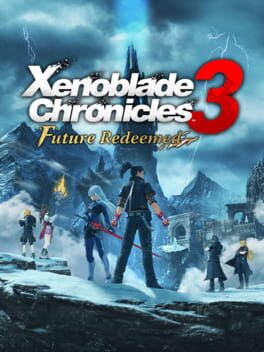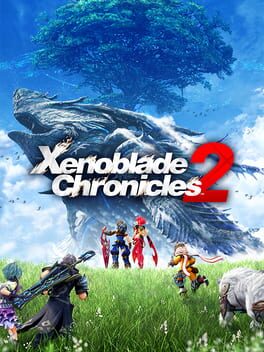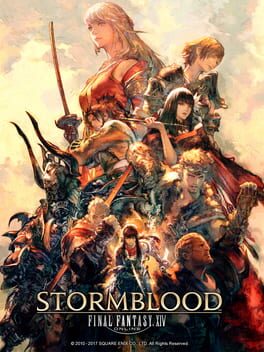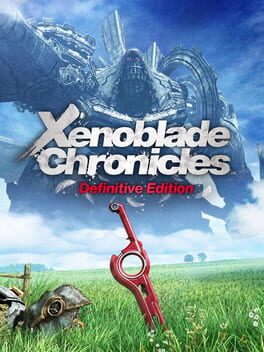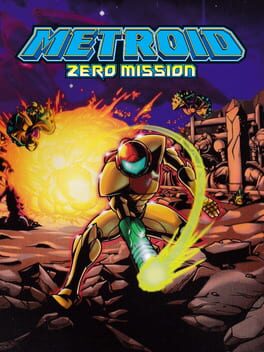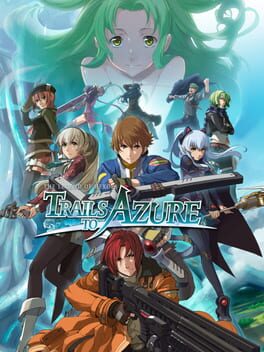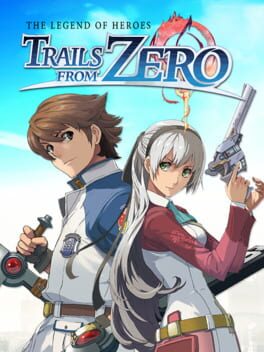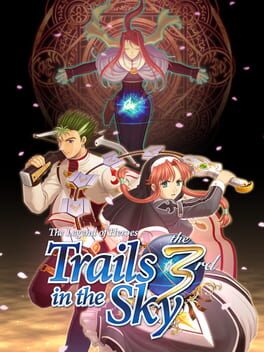eightleaves
2023
A welcome departure from the usual Trails formula without ever feeling derivative. Whereas most other Trails games focus on a larger-scale narrative, Kuro 2 opts to explore the intricacies of the main cast's dynamics. That's not to say that there are still aren't stakes, but they, to me, feel a lot more interpersonal with them tying into the overarching theme of humans and sin.
I do very much enjoy the route structure returning from Hajimari while also blending the 3 act structure from CS2/4. It helped keep the story consistently engaging despite a few sections not being particularly interesting for me. What sets Kuro 2 apart from the games before is its inclusion of the time rewinds and bad ends which helps add tension to almost every scene and action the characters make.
With this game being more character-driven than most, it has some immensely resonant scenes with the connect events in particular being the prime example of that. Kuro's cast is phenomenal and maybe the best in the series to date counting those outside of the Solutions Office. The villains too were great, having great dynamics with the cast members while being interesting in their own right.
If I had to nitpick about anything in this game, it would be the music, more specifically the direction. The music in these games are almost always a huge hit and while I do like this game's soundtrack, the bad direction is very noticeable to even someone like me who isn't particularly knowledgeable on music theory. Though with its weird utilization of certain songs in the wrong moments and spamming others to the point of scenes being immersion-breaking or fights not being as weighty, it's hard to turn an eye to it.
One final highlight of experiencing this game was both the theories I had while playing and those that I now have once finished. As an avid lore merchant, this game certainly scratched that itch of immersing me more into the mythos of Zemuria and its factions. As the series heads into its final stretch, I'm as happy as ever to be a fan of Trails.
Also, that final boss fight might be the single greatest peak in the entire series.
I do very much enjoy the route structure returning from Hajimari while also blending the 3 act structure from CS2/4. It helped keep the story consistently engaging despite a few sections not being particularly interesting for me. What sets Kuro 2 apart from the games before is its inclusion of the time rewinds and bad ends which helps add tension to almost every scene and action the characters make.
With this game being more character-driven than most, it has some immensely resonant scenes with the connect events in particular being the prime example of that. Kuro's cast is phenomenal and maybe the best in the series to date counting those outside of the Solutions Office. The villains too were great, having great dynamics with the cast members while being interesting in their own right.
If I had to nitpick about anything in this game, it would be the music, more specifically the direction. The music in these games are almost always a huge hit and while I do like this game's soundtrack, the bad direction is very noticeable to even someone like me who isn't particularly knowledgeable on music theory. Though with its weird utilization of certain songs in the wrong moments and spamming others to the point of scenes being immersion-breaking or fights not being as weighty, it's hard to turn an eye to it.
One final highlight of experiencing this game was both the theories I had while playing and those that I now have once finished. As an avid lore merchant, this game certainly scratched that itch of immersing me more into the mythos of Zemuria and its factions. As the series heads into its final stretch, I'm as happy as ever to be a fan of Trails.
Also, that final boss fight might be the single greatest peak in the entire series.
A well-needed pallet cleanser after years of mediocrity. It feels fun to finally play an expansion that values your time and feels like a game more than a mandatory job. That being said, the in-game narrative direction and presentation are still pretty poor despite having very well-done side quests and an expanding lore that only grows more intriguing. I think viewing DF as the foundation for a future of WoW that's more grounded and is a return to form allows me to appreciate it a lot more than something that attempts to rectify what came before.
"This... is the truth of our world. Memories melt in the morning light and then, a new day begins.
Roads stretch out before us. So many paths. Which do you choose? That's up to you.
Sometimes, you might run astray. You'll stop. Maybe cry out in frustration. But you know what? That's alright. For the roads... they go on without end.
So look up, face forwards, towards your chosen horizon... and just...
walk on."
Roads stretch out before us. So many paths. Which do you choose? That's up to you.
Sometimes, you might run astray. You'll stop. Maybe cry out in frustration. But you know what? That's alright. For the roads... they go on without end.
So look up, face forwards, towards your chosen horizon... and just...
walk on."
To describe Xenoblade Chronicles 2 as an ambitious game would be to undersell it. It’s a game that throws all of its darts at the board, and while not all of them stick to the landing, the majority hit the mark quite well. However, most of its greatest qualities come with an asterisk.
Its combat system is certainly a fresh take on the one introduced in XC1, but it did feel restricted and not as fun in most instances. The gacha system with the Blades was super engaging and encouraged both exploration and party diversity, but mandatory field skill checks ranged from mild immersion breaking to a tedious and frustrating wall. There were many moments that tested my patience, but despite that, this game is still great.
One of my biggest takeaways from XC1 was the fluidity of cutscenes, amazing soundtrack, gorgeous landscapes, and most importantly a profound message at the end of it all. I’m glad to say XC2 carried those same aspects over and even improved on some of them. One of my biggest complaints from XC1 was how the dialogue and character interactions were presented, but 2 delivered on that aspect very well, with some powerful speeches and emotionally resonant conversations between characters. One of 1’s biggest strengths was the personality its characters had and how they flowed well thematically, and 2 is no different. Blades and Drivers are a really cool concept, and I adored how that concept was interwoven into the narrative which allowed it to explore some really interesting topics with certain characters. Particularly the theme of memories, and how Blades view them as something just as finite and important as life is to a human, really resonated with me. XC2 portrays a world that is truthfully very ugly and cruel but still carries many pockets of tranquility and hope.
Its combat system is certainly a fresh take on the one introduced in XC1, but it did feel restricted and not as fun in most instances. The gacha system with the Blades was super engaging and encouraged both exploration and party diversity, but mandatory field skill checks ranged from mild immersion breaking to a tedious and frustrating wall. There were many moments that tested my patience, but despite that, this game is still great.
One of my biggest takeaways from XC1 was the fluidity of cutscenes, amazing soundtrack, gorgeous landscapes, and most importantly a profound message at the end of it all. I’m glad to say XC2 carried those same aspects over and even improved on some of them. One of my biggest complaints from XC1 was how the dialogue and character interactions were presented, but 2 delivered on that aspect very well, with some powerful speeches and emotionally resonant conversations between characters. One of 1’s biggest strengths was the personality its characters had and how they flowed well thematically, and 2 is no different. Blades and Drivers are a really cool concept, and I adored how that concept was interwoven into the narrative which allowed it to explore some really interesting topics with certain characters. Particularly the theme of memories, and how Blades view them as something just as finite and important as life is to a human, really resonated with me. XC2 portrays a world that is truthfully very ugly and cruel but still carries many pockets of tranquility and hope.
Disclaimer: This review is strictly about 4.0
This expansion had a lot to say, telling an evocative story about oppression and imperialism. With XIV’s usual handling of its heavier topics, I was expecting this to be genuinely great, and while it’s still very good, it could have been much better for me.
With an ensemble cast like this one spread out across essentially two different narratives, the overall mesh felt imbalanced and the pacing bloated which led to some characters feeling underutilized or just…different. That’s the best way for me to describe Stormblood, different. While it was by no means a complete bore, a few sections felt tedious. With how much of a thrill ride Heavensward was, this felt like a return to ARR, for worse. Still, where the game might have stumbled narratively it excelled in every other aspect. Some of the new landscapes and areas are among my favorites in the entire game coupled with one of the best soundtracks as well. The dungeons, trials, and raids were also fantastic and a clear step up in presentation.
Also, although I was mostly mixed on the main cast, I can’t say the same for the villains. Zenos and Yotsuyu balance each other well as an imposing megalomaniac and an emotionally driven one that directly challenges the themes of the expansion. Fordola also works extremely well as an antithesis to Lyse.
Looking back on Stormblood, it's an expansion with high highs and low lows. A few things get rectified with context from Shadowbringers and Endwalker, but I still can't help but see it as something that could have been so much more.
This expansion had a lot to say, telling an evocative story about oppression and imperialism. With XIV’s usual handling of its heavier topics, I was expecting this to be genuinely great, and while it’s still very good, it could have been much better for me.
With an ensemble cast like this one spread out across essentially two different narratives, the overall mesh felt imbalanced and the pacing bloated which led to some characters feeling underutilized or just…different. That’s the best way for me to describe Stormblood, different. While it was by no means a complete bore, a few sections felt tedious. With how much of a thrill ride Heavensward was, this felt like a return to ARR, for worse. Still, where the game might have stumbled narratively it excelled in every other aspect. Some of the new landscapes and areas are among my favorites in the entire game coupled with one of the best soundtracks as well. The dungeons, trials, and raids were also fantastic and a clear step up in presentation.
Also, although I was mostly mixed on the main cast, I can’t say the same for the villains. Zenos and Yotsuyu balance each other well as an imposing megalomaniac and an emotionally driven one that directly challenges the themes of the expansion. Fordola also works extremely well as an antithesis to Lyse.
Looking back on Stormblood, it's an expansion with high highs and low lows. A few things get rectified with context from Shadowbringers and Endwalker, but I still can't help but see it as something that could have been so much more.
XC1 is one of the more interesting experiences I've had with a story. Though I have quite a bit of issues, they feel slightly unfair when looked at in the context of the story this wants to tell.
For nearly the first half of the game, while I was enjoying myself, I felt a disconnect somewhere, like I was just experiencing something but not really having any strong feelings toward any particular aspect. That all changed around chapter 8, specifically the High Entia Tomb section where I started to feel some modicum of attachment to the story. From then on, the story and more importantly, the characters felt a lot more realized.
The combat, while initially I dismissed it as 'good enough' constantly progressed and expanded as subsequent party members joined and learned arts, getting to a point where combat felt extremely rewarding when you completely understood it. I cannot express how fun it is to stun-lock a boss infinitely with chain attacks.
The dub isn't particularly great, I considered switching over to Japanese a few times in the early chapters. Honestly, I'm glad I didn't. While some performances are pretty good and others pretty bad it strangely feels perfect with this type of world and characters. Call it Stockholm syndrome, but I grew to quite like the voice acting with it actually hitting its stride greatly in the last few chapters.
The music is the one thing I never changed my opinion on. From the start, I was blown away by the composition and it only got more and more stellar. This game has a perfect soundtrack and some of the best battle music I've ever heard. The game also looks really good with some stunning areas that really encourage exploration and very dynamic cutscenes with surprisingly fluid action sequences.
The story and characters are where I find myself more or less conflicted. I like them both but have an issue with how they are presented, mainly the dialogue in particular can get pretty silly at times with how on the nose it is. But like I said at the start this feels like an unfair criticism once you look at this game holistically. This game is so unapologetically itself and unabashedly genuine that it becomes contagious. From chapter 12 onward the story REALLY locks in and delivers on a truly epic tale of human perseverance with an ending I comfortably(and kind of surprisingly) say is one of my personal favorites ever. It has such a powerful final say and with the amount of twists and turns in the final act it was mindblowing to think this was the same game as what I played in chapter 1.
I think the correct way to word this game is something that ages beautifully as you play it. It took a while but it ultimately delivered on a powerful story, and one I'm very glad I got to experience. This is a pretty bold way to start a trilogy, but I'm really excited to see where it goes from here.
For nearly the first half of the game, while I was enjoying myself, I felt a disconnect somewhere, like I was just experiencing something but not really having any strong feelings toward any particular aspect. That all changed around chapter 8, specifically the High Entia Tomb section where I started to feel some modicum of attachment to the story. From then on, the story and more importantly, the characters felt a lot more realized.
The combat, while initially I dismissed it as 'good enough' constantly progressed and expanded as subsequent party members joined and learned arts, getting to a point where combat felt extremely rewarding when you completely understood it. I cannot express how fun it is to stun-lock a boss infinitely with chain attacks.
The dub isn't particularly great, I considered switching over to Japanese a few times in the early chapters. Honestly, I'm glad I didn't. While some performances are pretty good and others pretty bad it strangely feels perfect with this type of world and characters. Call it Stockholm syndrome, but I grew to quite like the voice acting with it actually hitting its stride greatly in the last few chapters.
The music is the one thing I never changed my opinion on. From the start, I was blown away by the composition and it only got more and more stellar. This game has a perfect soundtrack and some of the best battle music I've ever heard. The game also looks really good with some stunning areas that really encourage exploration and very dynamic cutscenes with surprisingly fluid action sequences.
The story and characters are where I find myself more or less conflicted. I like them both but have an issue with how they are presented, mainly the dialogue in particular can get pretty silly at times with how on the nose it is. But like I said at the start this feels like an unfair criticism once you look at this game holistically. This game is so unapologetically itself and unabashedly genuine that it becomes contagious. From chapter 12 onward the story REALLY locks in and delivers on a truly epic tale of human perseverance with an ending I comfortably(and kind of surprisingly) say is one of my personal favorites ever. It has such a powerful final say and with the amount of twists and turns in the final act it was mindblowing to think this was the same game as what I played in chapter 1.
I think the correct way to word this game is something that ages beautifully as you play it. It took a while but it ultimately delivered on a powerful story, and one I'm very glad I got to experience. This is a pretty bold way to start a trilogy, but I'm really excited to see where it goes from here.
My first real entry into platformers and it left quite an impression. The age never shows and it remains consistently engaging and challenging with power progression that feels earned. The levels were nice too with only one I really didn't enjoy, plus the interconnectivity of it all made backtracking not at all tedious.
1996
2020
Omori is a reminder of why I love stories. From that whimsical feeling of adventure in a brand new world with characters you know nothing of and seeing parts of yourself in each of them, to the feeling of elation as you come to the end of a journey knowing the lasting imprint that’s been left on you.
The theme of escapism is one that I’ve always been fond of as it’s been a heavy part of both my adolescence and adult life and the theme of grief, being something I personally have not experienced to the same magnitude of these characters, is something I can sympathize with. Omori has one of my favorite atmospheres in fiction, and a large part of that is attributed to the audiovisual storytelling.
From the start the soundtrack paints a very upbeat but melancholic tone that stays with the game going forward, with many scenes making me feel genuine anxiety and dread and even moments with no sound that gives an even stronger sense of uneasiness. The level design is even more amazing. Since we are effectively traversing through someone's mindscape, the world is designed perfectly to showcase the creative mind of the adolescent, both the dark and light. It gets cranked tenfold come the final portions of the game, where certain levels are genuinely horrifying. My personal favorite sequence in the game is when you are finally piecing the truth together with the remaining pictures in the photo album and I still remember the feeling of dread as I slowly began to piece things together myself.
Yes, Omori is a dark game. It tackles many heavy subjects, but it’s one of the most hopeful depictions of trauma I’ve seen to date. We are not without our scars, but burying them does nothing but cause it to smolder inside you until you cannot contain it. There are times where you feel lost or at a standstill while the world continues to spin and it can be extremely overwhelming, but Omori lets you know that it is okay. Sometimes we can forget that there are people that care for us, and it can cause us to dissociate ourselves from the world around us. But there is always someone to take that burden off of you, if only even a little. Omori is about grief and how we all deal with it in different ways internally and externally, but it is also a story about reconciliation with our mistakes and the affirmation that we can be better.
Coming back to this with context from the later games only makes me view this already masterful game in an even better light. Perfectly wrapping up existing arcs and storylines coming out of SC and setting up new conflicts, concepts, and storylines that carry on 5 games later, all while telling its own beautifully tragic story about a man stricken with grief and hellbent on punishing himself. I'd say Sky the 3rd, while not being my favorite game in the series, stands as the true testament to the genius of Falcom.
